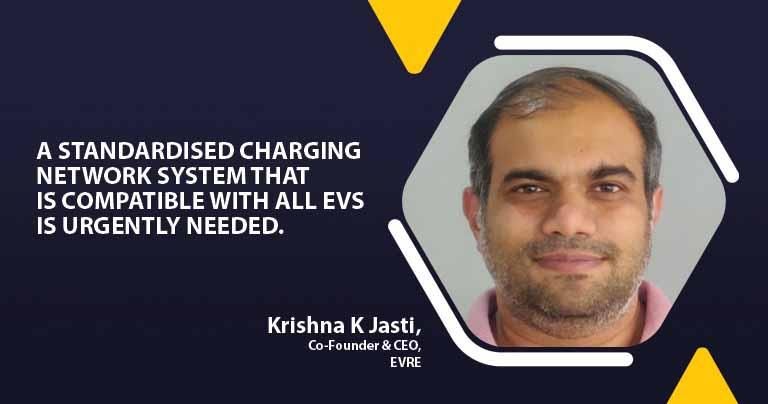We require a minimum of 100,000 charging points at a 1:50 ratio
By EPR Magazine Editorial February 5, 2022 10:35 am IST
By EPR Magazine Editorial February 5, 2022 10:35 am IST

Krishna K Jasti, Co-Founder & CEO, EVRE, In Ann Interview with EPR Magazine
What are the key factors that drive the demand of EV charging infrastructure?
The Indian EV market is observing tremendous growth, and so is the demand for public EV charging infrastructure in the country. In a recent announcement, estimates by Grant Thornton Bharat and FICCI suggest that India will need more than 4 lakhs charging stations for 20 lakh plus EVs that are projected to hit the roads by 2026. The rapid increasing EV sales is one of the main factors, presently; recent market data shows EV 2W sales are up 421 percent y-o-y to 118K units while EV 4W sales in 2021 have risen 171 percent to 9840 units indicating acceleration of EV charging infra growth. This apart, it is also quite evident that in order to encourage e-mobility in India, government is also pushing through subsidies that are incentivising the increasing EV sales ultimately leading to the growing demand for EV charging infra in the country.
What are the emerging trends in EV infra? What types of facilities and solutions are in demand?
One of the most prominent trends we have witnessed is the shift of fleet owners from ICE vehicles to EVs. E-commerce giants and last-mile delivery companies are leading the trend of shift towards EVs. This has been particularly facilitated by the Covid induced curbs leading to flourishing online marketplaces that seek extensive and expansive fleet networks across the country completing last-mile deliveries for profitability and in turn sustainability. Another growing trend is the electrification of residential and commercial buildings. Realty firms are welcoming the trend of having charging hubs by associating with energy providers to ultimately benefit the end users and promote the concept of green building.
How is the EV charging infrastructure developing in the country?Following the FAME-II, the government has provided an overall incentive of ₹1,000 crore on the charging infrastructure. Under the second phase, 25 states, 68 cities, 2877 electric vehicle charging stations, 9 express ways, 16 main roads, in total 1576 charging stations were approved by the heavy industry ministry. Whereas, if we talk about state-wise EV sales, UP has the highest number of EV registrations at 255,700 units, Delhi at 125,347 units and Karnataka at 72,544 EVs. Therefore, it can be predicted that these states might witness fast-track development of EV charging infrastructure with support by power distribution companies, DISCOMs, urban development authorities and transport corporations.
What are the opportunities and challenges you look for EV battery and charging providers?
Considering on the faster growing 3W EV space, especially the logistics fleet owners require large scale ‘parking and charging’ infrastructure. Further, the challenge of the 2W and 3W fleet owners is to fulfil the requirement of on-the-go small-time charging points for completion of the last-mile 30- 40 KM distances. The clear observation around the industry growth vs. charging infrastructure installation is that the charging infrastructure is not growing at the same rate pertaining to fleets (2W and 3W). To meet the demand of charging infrastructure for 4-5 million 2W EVs, the country needs at least about 100,000 charging points with a ratio of 1:50.
Apart from this, utilisation of land, lack of power infra, lack of service options and multi-window clearance are some of the issues that need streamlining. Addition to this, there is an urgent need to standardised charging network system that is compatible with all EVs
What is your outlook on the charging infrastructure development?
Ans. As per a report from SIAM, India has a momentous vision to develop at least 4,00,000 chargers by 2026 to support the EVs on roads however, this can only be possible with the support of public charging infrastructure developing at the same rate to meet the demand. There are several challenges, out of which the lack of charging infrastructure is a top barrier to EV adoption. Even though most EVs are charged at home or work, roll-out of public charging is critical to supporting EV growth. The charging infra needs an even distribution across the country. But on the other hand, the amalgamation of State governments rolling out EV subsidies, international auto OEMs foraying into India and brands scrambling to be a part of it, all indicates ample of opportunities in the sector.
We use cookies to personalize your experience. By continuing to visit this website you agree to our Terms & Conditions, Privacy Policy and Cookie Policy.